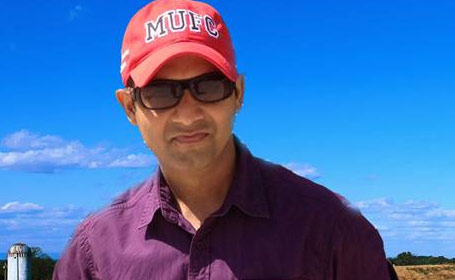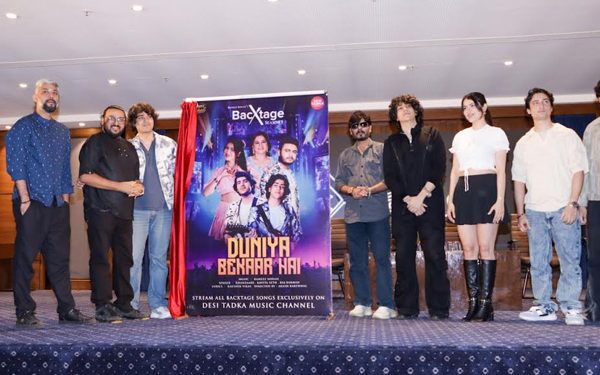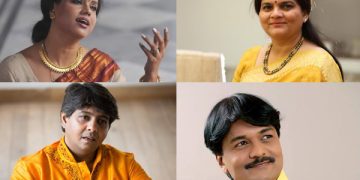Throughout its existence, Indian music has constantly evolved its sound and style without losing its essence. Fusing different influences from varied cultures, it is always evolving finding new ways to express emotions and melodies. Even today, with the explosion of communication and commercialization, the heart of Indian music- beyond what Hindi films churn out- is very much intact. There are always lovers of tradition with skills to make melodies contemporary yet timeless.
Faridoon Shahryar is an executive living a fast-paced corporate life. What sets him apart is his passion for music and poetry that has inspired him to make an album out of his father- Professor Shahryar’s prose and also make music under (a newly coined category) Ghazal Rock.
Radioandmusic.com caught up with Shahryar on his inspiration, his new songs (and album) and the road ahead.
Excerpts:
What was the idea behind the album- ‘Palkon Ko Bhigoyen Kaise’?
The inspiration was my father Professor Shahryar’s poetry. He was a Jnanpith Award winning Urdu Poet and the lyricist of Muzaffar Ali’s Umrao Jaan. My friend Navneet Kedar and I started working on my father’s poetry around four years back. Navneet composed, arranged and recorded the tracks while I’ve sung them. We took one Ghazal or Nazm at a time and thought, discussed the basic idea of the poetry, the mood and how the emotions should strike a chord with the listeners.
We worked on minimalistic music arrangements and how the emotion(s)- smeared in the words ought to be conveyed as effectively as possible.
Artistaloud.com launched five Ghazals/Nazms in the album ‘Palkon Ko Bhigoyen Kaise’.
I have written, composed and sung over 100 jingles for radio and this is my first effort in releasing a compilation of songs.
Which of the track is closest to your heart? Was there an underlying theme to the collection of songs?
All are very special as we lived through them at various stages of our lives. But ‘Palkon Ko Bhigoyen Kaise’ is very special as we worked on it for over a month and recorded it twenty days before my father passed away.
I am glad my father heard it and put it on his mobile to listen to it again and again. There’s no set theme, but the sadness associated with the setting sun, the vacuum of the night, the loneliness, sense of loss and realism are the predominant emotions. “Naseem-e-soobh ro rahi hai” is a Nazm written on the death of India’s President Zakir Hussain sahab whom my father idolized a lot.
It is very special because of its spiritual theme.
How did you manage to find the time to record the songs and how are you promoting it? You have shot a couple of videos in Japan and Malaysia- any reason why?
If you are passionate about something, you will always find time. I was pursuing music professionally before returning to Journalism (I’ve done a Post Graduation Diploma in Journalism from Times School Of journalism and worked with The Asian Age besides writing for several newspapers, magazines and portals).
We recorded all these compositions one at a time and maybe because of this they sound different from each other. We’ve got press coverage in English and Hindi newspapers, popular websites. (Regarding the video) I happened to visit Tokyo and Malaysia and we shot for ‘Palkon Ko Bhigoyen Kaise’ over there. It wasn’t planned. We are working on more music videos. An Australian radio channel-ethnic360.com- has played two of my numbers ‘Wo Andheri Raat Ki Chaap Thi’ and ‘Shab-e-Gham Kya Karein’. The music video of ‘Wo Andheri Raat Ki’ and ‘Palkon Ko Bhigoyen Kaise’ have received over two lakh and 1.6 lakh views respectively on Bollywood Hungama so far. The music is doing well on Hungama App as well.
The five tracks in the album are under ‘Ghazal Rock’. Elaborate
The genre Ghazal Rock was coined by Artist Aloud. Shab-e-Gham is an up tempo number with high pitched singing and guitar while there are other tracks that have the soft rock elements. I personally feel this music is beyond genre as it is the mood or the emotion of the poetry that guides us in choosing the music arrangements, the pitch or the rhythm arrangements. Navneet decides all of this and mostly he is right. If I have a point of view, we mutually discuss and decide how to make something sound better. For both of us it is the journey of working on our music which is far more satisfying than anything else. In one of our recent unreleased number, we’ve had some fun guitar portions that will be hopefully appreciated once it is released.
Now that you have your songs out, any plans to perform it live? Can we expect more in the future?
I performed live at the prestigious Kennedy Auditorium in AMU, Aligarh recently and got an extremely encouraging response. I am very keen on performing live and hopefully will be doing it more often.
What is your opinion on the current state of the music industry?
The film music is all pervasive specially because of the marketing involved and the star value. Platforms like Hungama, Youtube, Artist Aloud, ITunes are very good for checking piracy. Social Network is a very good medium for spreading the word on your music. It will surely become a big tool of music marketing very soon. I don’t know if the music standard has gone down. There are all sorts of creations that are available in the market, good or bad is relative. I can assure the listeners that what we are offering is hopefully something unique and is very good news for the discerning listeners that lay emphasis on quality lyrics and good music.
Do you feel that music/ songs like Ghazals, Classical music are losing out to Bollywood?
I strongly feel that after Jagjit Singh’s untimely death, the Ghazals genre needs some good options for the listeners and given a chance I can offer something unique with brilliant poetry of my father and classy modern music fused with Indian classical elements. A fine fusion is assured. Ghazals have a big market but one ought to offer something good. Classical music caters to a niche audience but more efforts should be done to create interest about it amongst the youth. Bollywood offers popular music and there’s nothing wrong in it if a vast majority appreciates it. But non- film music must find its footing the way it did during 1990s when Alisha (Chinai) and Daler (Mehndi) recorded huge numbers. Jagjit Singh’s music always did extremely well. It can surely happen again.
Anything you would like to say to our readers?
Well, what I am trying to do is to work on serious music that (surely) has an entertainment value at the cerebral level. I hope I can find more support in marketing my music on a bigger platform as I am very confident that what I am having can connect with a bigger audience.












